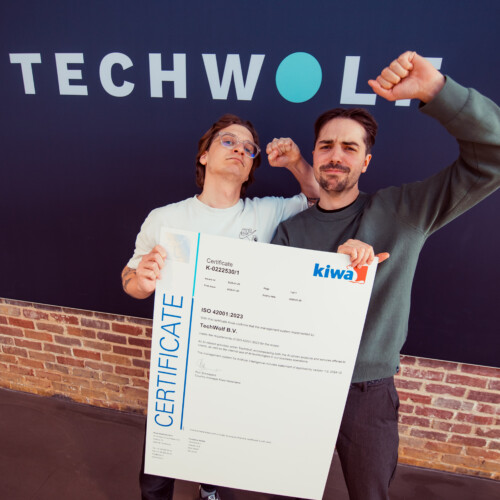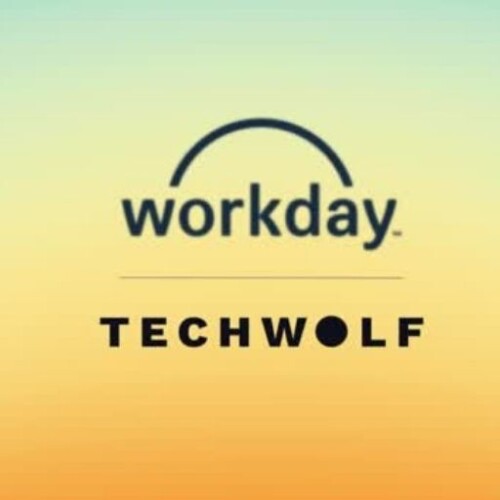Insights from SKILLS /by TechWolf in New York
Navigating the transformative journey to a skill-based approach
On 8th May, we were thrilled to welcome guests to our first SKILLS /by TechWolf event in New York. A huge thank you to our team, panellists, guests, and The Skills Strategy Working Group, who joined us for the evening.
Our COO and co-founder Michäel Wornoo opened the evening, emphasising why TechWolf exists - not as another HR platform, but instead as skill data infrastructure on a mission to enable HR to solve real business challenges.
“At TechWolf, we pride ourselves on our core values: caring deeply about our people, our customers, and the problems we aim to solve,” said Michäel. “Understanding and utilising skills within organisations is a complex challenge, but we are excited to share how we are on the verge of helping our customers achieve significant breakthroughs. Thank you to everyone who joined us, and a special thanks to Dani Johnson, cofounder and Principle Analyst at RedThread Research our panel moderator, for guiding this important conversation.”
The ‘why’ behind moving to skill-based
Opening our first discussion for the evening with this quote, Dani Johnson said “94% of organisations are considering skills, but only 14% have an organisational skills strategy. HR has historically focused on processes rather than skills. Competencies have traditionally solved business problems, but skills are now the primary focus.”
One of the highlights of the evening was a fireside chat with Diane Gherson, the former Chief Human Resources Officer (CHRO) at IBM, and also now a member of TechWolf’s board. Diane led a significant transformation at IBM, reshaping the company’s approach to HR and fostering a culture of continuous growth.
Transformation through AI and automation
During the chat, Diane shared her insights on how IBM used AI to reimagine and automate the company’s HR processes, enhancing decision-making, and delivering a simpler, more personalised and responsive employee experience. Diane emphasised that the integration of AI was not just about technology but also about cultural change—creating an environment where continuous learning and growth were at the forefront.
Building a culture of continuous growth
Diane highlighted the importance of fostering a culture that encourages continuous learning. At IBM, this meant shifting the focus from traditional job roles to looking at skills. She shared specific strategies and initiatives that helped cultivate this culture across learning and career development.
Lessons learned and best practices
Drawing from her experience, Diane provided valuable lessons and best practice for other organisations looking to embark on a skill-based transformation. She stressed the necessity of having strong leadership role-modeling, clear communication, and a robust framework for managing change. Diane also spoke about the challenges they faced, such as ensuring data transparency and building employee buy-in to change, and how they overcame these hurdles including rewiring all management processes to reinforce the importance of skills, and engaging employees in the design of change.

The ‘how’ behind moving to skill-based - in practice
The second half of the SKILLS /by TechWolf panel featured an insightful discussion with prominent leaders from various industries: Nick Statler from United Airlines, Dan Weiss from MetLife, and Angela Le Mathon from GSK. The conversation, moderated by Dani, delved into practical applications of skill data, challenges, and success stories from their respective organisations.
Dan Weiss, VP People Planning & Insights Consultants at MetLife
Dan Weiss provided insights into MetLife's efforts towards skill-based talent practices. With a strong background in people analytics and strategic workforce planning, Dan shared how MetLife has navigated the challenges of implementing a skills strategy. He discussed the importance of data transparency and the need for clear communication to ensure employee engagement. Dan also highlighted the cultural shift required to move from traditional job descriptions to a skill-based framework, emphasising that leadership commitment and continuous learning are crucial for success.

Angela Le Mathon, VP People Data & Analytics at GSK
Angela Le Mathon discussed GSK's innovative approach to integrating skill data into their HR strategy. She shared how GSK uses AI and analytics to identify skill gaps, predict future skill needs, and support employee development. Angela emphasised the importance of creating a common language for skills to facilitate better coordination across departments. She also spoke about the role of HR in enabling employees to take ownership of their development and the need for continuous validation and updating of skills data to keep it relevant and useful.

Nick Statler, MD of Talent Acquisition & Talent Management at United Airlines
Nick Statler shared United Airlines' journey in adopting a skill-based approach to talent management. Nick emphasised the importance of identifying and leveraging internal talent to meet the changing and dynamic needs of the airline industry. He discussed how United Airlines uses skills data to enhance talent acquisition, improve internal mobility, and support career development. Nick highlighted the success of their internal talent marketplace, which has been instrumental in matching employees' skills with new opportunities within the company.

Key Takeaways
Internal Mobility and Talent Marketplaces: Nick Statler emphasised the success of United Airlines' internal talent marketplace in facilitating employee movement and skill development within the organisation.
Data Transparency and Communication: Dan Weiss highlighted the critical role of data transparency and clear communication in ensuring employee buy-in and engagement with skill-based initiatives.
AI and Analytics for Skills Identification: Angela Le Mathon shared GSK's use of AI and analytics to proactively identify skill gaps and predict future needs, underscoring the importance of a common skills language.
Leadership and Cultural Shift: All panelists agreed that strong leadership support and a cultural shift towards continuous learning and skills development are necessary to successfully implement a skill-based strategy.
The panel discussion gave attendees valuable insights into the practical challenges and successes of implementing skill-based approaches in diverse industries. The experiences shared by Nick, Dan, and Angela highlighted the transformative potential of rich, relevant skill data and the importance of a strategic, well-communicated approach to leveraging this data for decision making.
Q&A with participants
The session concluded with an engaging Q&A segment, where the panellists addressed questions from the audience. Participants were keen to learn more about the practical aspects of implementing AI in HR, measuring the impact of these changes, and maintaining a human-centered approach in a technology-driven environment.




